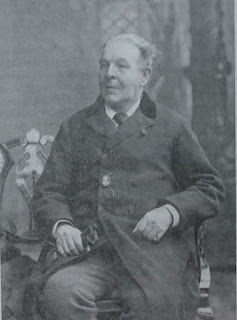On the 2nd March Benjamin Dimmock of Prince Edwin Street in Everton attended the Wrexham horse fair with master carter Isaac Anwyll, from Mill Street in Toxteth. Also there were brothers George and Henry Cooper, with whom they had had previous quarrels, and their friends Henry Allcock and Francis Tomkinson.
 Nothing happened whilst there but when the men saw each other near the station George Cooper shouted that Dimmock was 'the thief that has got my £36.' A fight broke out between the two men, leaving Dimmock with a bruised nose. Cooper and his party then got on a train to Chester, taking a different carriage to Dimmock but on arrival there the arguing started again.
Nothing happened whilst there but when the men saw each other near the station George Cooper shouted that Dimmock was 'the thief that has got my £36.' A fight broke out between the two men, leaving Dimmock with a bruised nose. Cooper and his party then got on a train to Chester, taking a different carriage to Dimmock but on arrival there the arguing started again.As the Coopers walked down the platform to join the connecting train to Birkenhead, Dimmock shouted insults from the carriage, leading to Herbert challenging him to come off the train. Dimmock did so and a fist fight occurred between him and George, but at some point George launched a hefty kick into the abdomen. The fight ended as the train was due to depart and all the men quickly boarded. During the journey from Chester to Birkenhead Dimmock vomited and complained of pains in his abdomen, leading to him taking a cab from the Liverpool landing stage to his home, where he went straight to bed.
With Dimmock making no improvement, Dr G S Taylor tended to him from 8th March, when he saw that he still had a black eye and bruising to the abdomen. The wounded man struggled on for 4 weeks but died on 4th April, a post mortem finding extensive peritonitis and inflammation of the bowels, caused by repeated kicks and punches to the abdomen, with the rest of the 48 year old's body being strong.
After the Coroner's Inquest returned a verdict of manslaughter George Cooper surrendered himself but was released on bail pending his trial at the Liverpool Assizes on 11th August, where he was found guilty. However despite strongly criticising Cooper for his cowardice, the judge sentenced him to just four months
imprisonment with hard labour.



